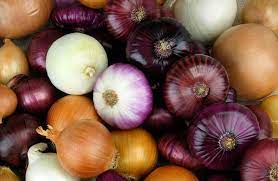
Onions are highly nutritious and have been associated with several benefits, including improved heart health, better blood sugar control, and increased bone density.
Though all vegetables are important for health, certain varieties offer unique benefits.
Onions are members of the Allium genus of flowering plants that also includes garlic, shallots, leeks, and chives.
These vegetables contain various vitamins, minerals, and potent plant compounds that have been shown to promote health in many ways.
In fact, the medicinal properties of onions have been recognized since ancient times, when they were used to treat ailments like headaches, heart disease, and mouth sores.
Here are impressive health benefits of onions.
1. Packed with nutrients
Onions are nutrient-dense, meaning they’re low in calories but high in vitamins and minerals.
One medium onion has just 44 calories but delivers a considerable dose of vitamins, minerals, and fiber (2Trusted Source).
This vegetable is particularly high in vitamin C, a nutrient involved in regulating immune health, collagen production, tissue repair, and iron absorption.
Vitamin C also acts as a powerful antioxidant in your body, protecting your cells against damage caused by unstable molecules called free radicals.
Onions are also rich in B vitamins, including folate and vitamin B6 — which play key roles in metabolism, red blood cell production, and nerve function.
Lastly, they’re a good source of potassium, a mineral which many people are lacking.
In fact, the average potassium intake of Americans is less than half the recommended daily value (DV) of 4,700 milligrams (mg).
Normal cellular function, fluid balance, nerve transmission, kidney function, and muscle contraction all require potassium.
Onions are low in calories yet high in nutrients, including vitamin C, B vitamins, and potassium.
2. May benefit heart health
Onions contain antioxidants and compounds that fight inflammation, decrease triglycerides, and reduce cholesterol levels — all of which may lower heart disease risk.
Their potent anti-inflammatory properties may also help reduce high blood pressure and protect against blood clots.
Quercetin is a flavonoid antioxidant that’s highly concentrated in onions. Since it’s a potent anti-inflammatory, it may help decrease heart disease risk factors, such as high blood pressure.
A study in 70 people with overweight and high blood pressure found that a dose of 162 mg per day of quercetin-rich onion extract significantly reduced systolic blood pressure by 3–6 millimeters of mercury (mmHg), compared to a placebo (8Trusted Source).
Onions have also been shown to decrease cholesterol levels.
A 2014 study in 54 females with polycystic ovarian syndrome (PCOS) found that consuming large amounts of raw red onions (80–120 grams per day) for 8 weeks reduced total and LDL (bad) cholesterol compared to a control group (9Trusted Source).
Additionally, evidence from animal studies supports that onion consumption may reduce risk factors for heart disease, including inflammation, high triglyceride levels, and blood clot formation.
Research shows that eating onions may help reduce heart disease risk factors, such as high blood pressure, elevated triglyceride levels, and inflammation.
Loaded with antioxidants
Antioxidants are compounds that inhibit oxidation, a process that leads to cellular damage and contributes to diseases like cancer, diabetes, and heart disease (13Trusted Source).
Onions are an excellent source of antioxidants. In fact, they contain at least 17 different varieties of flavonoid antioxidants.
Red onions, in particular, contain anthocyanins, which are plant pigments in the flavonoid family that give red onions their deep color.
Multiple population studies have found that people who consume more foods rich in anthocyanins have a reduced risk of heart disease.
For example, a study in 43,880 males showed that habitual intakes as high as 613 mg per day of anthocyanins were correlated to a 14% lower risk of nonfatal heart attacks (15Trusted Source).
Similarly, a 2018 review concluded that consuming higher amounts of anthocyanin-rich foods was associated with a lower risk of heart disease and heart disease mortality (16Trusted Source).
Additionally, anthocyanins have been found to protect against certain types of cancer and diabetes.
Red onions are rich in anthocyanins, which are powerful plant pigments that may protect against heart disease, certain types of cancer, and diabetes.
Contain anti-cancer compounds
Eating vegetables of the Allium genus like garlic and onions has been linked to a lower risk of certain types of cancer, including stomach and colorectal cancer.
A review of 26 studies showed that people who consumed the highest amount of allium vegetables were 22% less likely to be diagnosed with stomach cancer than those who consumed the lowest amount.
Moreover, a 2014 review of 16 studies in 13,333 people demonstrated that those with the highest onion intake had a 15% reduced risk of colorectal cancer compared to those with the lowest intake.
These cancer-fighting properties have been linked to the sulfur compounds and flavonoid antioxidants found in allium vegetables.
For example, onions provide onionin A, a sulfur-containing compound that has been shown to decrease tumor development and slow the spread of ovarian and lung cancer in test-tube studies.
Onions also contain fisetin and quercetin, which are flavonoid antioxidants that may inhibit tumor growth.
A diet rich in allium vegetables like onions may have a protective effect against certain cancers.
Help control blood sugar
Eating onions may help control blood sugar, which is especially significant for people with diabetes or pre-diabetes.
An older study in 42 people with type 2 diabetes demonstrated that eating 3.5 ounces (oz), or 100 grams, of raw red onion significantly reduced fasting blood sugar levels after 4 hours.
Additionally, multiple animal studies have shown that onion consumption may benefit blood sugar control.
A study showed that rats with diabetes fed food containing 5% dried onion powder for 8 weeks experienced decreased fasting blood sugar levels and had lower triglyceride and cholesterol levels compared to a control group.
Specific compounds found in onions, such as quercetin and sulfur compounds, also possess antidiabetic effects.
For example, quercetin has been shown to interact with cells in the small intestine, pancreas, skeletal muscle, fat tissue, and liver to control whole-body blood sugar regulation.
Follow us on Facebook/ twitter














